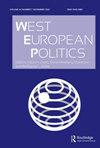A theory of external judicial politics: the ECJ as cautious gatekeeper in external relations
IF 3.6
1区 社会学
Q1 POLITICAL SCIENCE
引用次数: 0
Abstract
Abstract Scholars have extensively studied how the European Court of Justice (ECJ) interacts with Member State courts. The ECJ’s behaviour vis-à-vis international tribunals remains, however, underexplored despite its salience for EU global actorness. The ECJ does at times condone and at other times reject cooperation with international tribunals in that it either authorises or prohibits EU and Member State participation in relevant regimes. What drives ECJ behaviour? While intuitive, European law fails to fully account for it. This study draws on models of bounded discretion to explain ECJ behaviour in external judicial politics. It argues that two factors – namely jurisdictional overlap between the European legal order and international tribunals as well as the centrality of these tribunals in global governance – decisively influence the preferences of the ECJ, Member States, the European Commission and Parliament and thus delimit the range of politically viable rulings and shape ECJ behaviour.外部司法政治理论:欧洲法院作为对外关系的谨慎守门人
学者们广泛研究了欧洲法院(ECJ)如何与成员国法院互动。然而,欧洲法院在-à-vis国际法庭上的行为仍未得到充分探讨,尽管它在欧盟全球行动者中占有突出地位。欧洲法院有时宽恕,有时拒绝与国际法庭合作,因为它要么授权,要么禁止欧盟及其成员国参与相关制度。是什么驱动了欧洲法院的行为?虽然直观,但欧洲法律未能充分考虑到这一点。本研究利用有限自由裁量权模型来解释欧洲法院在外部司法政治中的行为。它认为,两个因素——即欧洲法律秩序和国际法庭之间的管辖权重叠以及这些法庭在全球治理中的中心地位——决定性地影响着欧洲法院、成员国、欧洲委员会和议会的偏好,从而划定了政治上可行的裁决范围,并塑造了欧洲法院的行为。
本文章由计算机程序翻译,如有差异,请以英文原文为准。
求助全文
约1分钟内获得全文
求助全文
来源期刊

West European Politics
POLITICAL SCIENCE-
CiteScore
10.00
自引率
7.10%
发文量
58
期刊介绍:
West European Politics (WEP)has established itself as one of the most authoritative journals covering political and social issues in Western Europe. It has a substantial reviews section and coverage of all national elections in Western Europe. Its comprehensive scope, embracing all the major political and social developments in all West European countries, including the European Union, makes it essential reading for both political practitioners and academics.
 求助内容:
求助内容: 应助结果提醒方式:
应助结果提醒方式:


